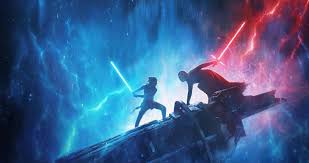PopPolitic: Dragons, Fandom and Consumer Power
“All art is quite useless” Oscar Wilde.
Wilde is of course right. In terms of plain old survival;
art is useless. That is part of its joy. To have the time to try to make or
enjoy something beautiful, or thought provoking, is the one of the most sublime
aspects of leisure. That’s why the verb “To Netflick” exists. That is also why
a lot of the internet, is people talking about the useless . We share our overlapping
narratives whether they are fictional or not.
So, the summer’s gone and so too has that weird moment in
time when my YouTube recommendations were chockablock with Vlogs and video
essays; ranting about Star Wars and Game of Thrones. Now, I know I locked
myself into an algorithm bubble. You Tube’s A.I. just fed me that stuff because
I click, click, click. Even so, that’s a lot of content generated and a very
big bubble.
When the new trilogy of Star wars came out and everybody was
happy for a while and then the Fandom started to complain that the Force Awakens
was too similar to A New Hope. So, when Disney made the next one they decided
to usurp their expectations and do everything different.
The fandom complained that the film went too far. Now J.J.
Abrahams has retaken his place in the director’s chair as a “safe pair of
hands” which is as much a signal to the Fandom that Disney has taken note
(again) and will fix the problem.
Now you could say, “There are more important things to fret
about and criticize,” and you’d be right.
However, note how much more effective this model of consumer
“activism” is when backed up by threatening the bottom line of the company
involved. Solo: a star wars story was financially disappointing for Disney, and this
sent the message that the fans might not let the corporation milk the Star Wars cash cow for all they can.
The complaints about
the end of game of thrones came too late, but you can be sure that any future
projects with that intellectual property will take note and be influenced by
them, ( in fact J.J. Martin has been handed a blueprint of what not to do) and
I’ve spoken about the obvious impact of the fandom on the Star wars films.
There’s a lesson here to be taken. We have power as consumers and we need to
start using it politically.
The extreme right is already way ahead of us on this, boycotting
Star wars for having more race and gender representative castings, burning Nike
shoes for being “woke”. Sure, you can argue that these protests were largely
ineffective, in fact they just fed the media machine. This is because the
numbers were too small, unorganized and just didn’t get enough traction. Also, they
were protesting something that (for the moment) just wouldn’t mobilize huge
numbers of people.
Despite declaring record profits over the last decade the
three biggest computer game companies have laid off huge numbers of staff. What
if fans of those games boycotted the products on the staff’s behalf? What if there was a “Don’t buy Amazon” day to
protest that companies dire track record of badly treating their minimum wage
overworked staff?
We need to start seeing ourselves as more of what we have
actually become: a consuming class. We can no longer build a strong union
movement again, but a consumer movement would have strength. The union movement
used the denial of production and therefore profit for the owners of the companies,
if we could wield our purchasing with the same determination and focus, then we
could put some power back in our court. If we can change a multi-billion dollar
film, then together we can change the world. We need to survive, in order to
make more art. We can start doing that by voting with our wallets, the boycott
can be the industrial strike of the 21st Century. It is time to start a rebellion against the corporate Empire.




Comentarios
Publicar un comentario